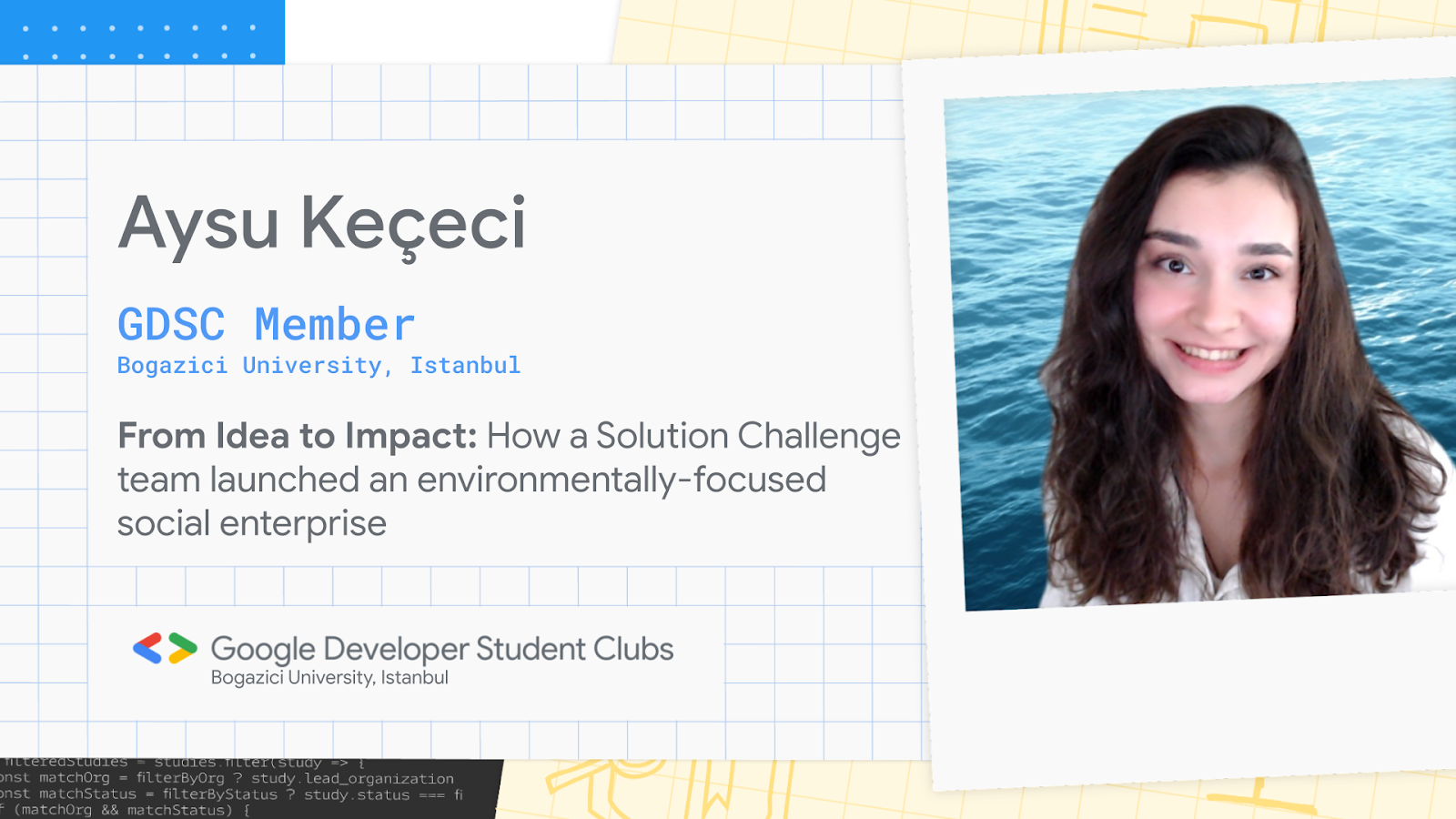Posted by Merve Isler, Regional Developer Relations Community Manager, Turkey
Some challenges affect everyone regardless of borders or nationality, and combating climate issues is no different. Aysu Keçeci, a student in Turkey with an avowed reverence for the sea, found herself increasingly distressed by the growing amount of plastic in the world’s oceans. She notes, “As an Aegean, the seas are a big part of my life, Unfortunately, I have grown up observing that our waters are polluted daily, and I know that plastics now make up 80% of marine garbage, and if we don't take precautions, there will be more plastic in our seas than fish in 2050. That's why plastic pollution has always been a problem I wanted to address.”
As part of a global community, Google Developer Student Clubs (GDSCs) members are empowered to make an impact on the issues that matter both on the global and local scales. She decided to join the 2021 Solution Challenge, and took part in a local hackathon organized by the GDSC Solution Challenge Incubation Program. She and other GDSC members at Bogazici University on her team chose to create an app to encourage plastic recycling, never guessing it would lead to mentorship, guidance, and tools to launch an environmentally-focused social enterprise start-up.
Choosing the features and functions
When building the app, the team leveraged Flutter for its cross-platform advantages and used other Google tools such as Firebase, Firestore, Cloud, Maps, Fonts, and Analytics. In the app, users locate and open dedicated recycling bins by scanning a QR code or using a smartwatch or wristband. They can earn “coins” based on the amount of plastic they recycle and by engaging in challenges. Meanwhile, the app, called WE, displays tangible benefits to the environment from the users’ recycling efforts.
Encouraging behavior change with gamification
Aysu acknowledges that designing an app is one thing--bringing it into reality is another. Keçeci shares, “in real product development, user experience, ease of learning, and convenience become more critical than when you are designing a prototype.” To drive adoption, the WE App team chose gamification as a framework for the recycling app, looking to engage and motivate users by adding competition, social interaction, and feedback into the UI and help make recycling easy and fun. Aysu was particularly inspired by entrepreneur Colin Huang, who integrated gamification into Pinduoduo, an e-commerce company that encourages user collaboration.
From idea to impact
After three intense days of working at a feverish pace on little sleep, Aysu and the team presented their idea--which won the hackathon! The WE app then got selected as one of the top 50 projects in the Solution Challenge (with the support of Solution Challenge Incubation Program), landing the team special mentorship sessions with Google developers. This support on many levels led to their acceptance in one of Turkey’s top incubators: İTÜ Çekirdek İncubation Center, which offered a working space and exposure to the center’s network of companies and entrepreneurs. The project was also accepted into the Arya WIP Investment Preparation Acceleration Program, which supports women entrepreneurs, earning the team even more credibility and traction.
Perseverance makes all the difference
Aysu acknowledges that working with a small team of three developers can present new problems and opportunities every day--but support from Google mentors, jury members, and GDSC helps. “It's very bumpy, but it's been a journey that we've learned a lot about and enjoyed,” she says. The team is currently working with Borusan Mannesmann, one of the largest industrial companies in Turkey, to provide the app and bins to employees. They’re also competing in the semifinals of the İTÜ Çekirdek İncubation Center’s Big Bang Startup Challenge and talking with other potential corporate partners.
Looking towards the future
The team is already thinking about WE’s next stage. She and the other founders plan to redesign the WE bins to look more stylish and start producing simple products from the plastics collected, perhaps by partnering with innovative companies around the world that value sustainability.
“I've actually seen that people value living in a sustainable world. So it was surprising and gratifying for me to realize that they were ready to do something about it and take action because even people who did not recycle in the old status quo adapted very quickly.”
As she considers the progress she’s made so far, Aysu credits the GDSC’s culture of innovation, support, and feedback for playing a big part in WE’s creation and success. “You can quickly get involved in a community,” she says, “and thus you have a better opportunity to pursue things that excite you.”
Learn more about the activities and opportunities GDSCs offer and how to get involved.
Register your team for the Solution Challenge in January and make an impact.
